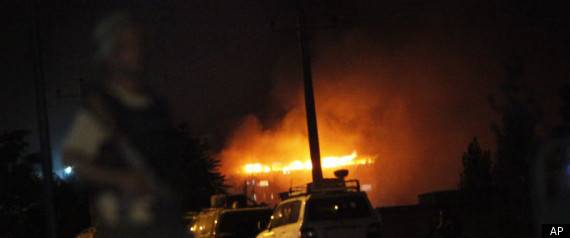NATO Helicopters End Kabul Hotel Siege That Leaves At Least 19 Dead

Intercontinental Hotel Attack: NATO Helicopters End Kabul Hotel Siege That Leaves At Least 19 Dead

KABUL, Afghanistan (AP) Afghan President Hamid Karzai vowed Wednesday that his army and police would be ready to take over from foreign forces as planned despite a brazen assault on one of Kabul's premier hotels that left 19 people dead including all eight attackers.
The more than five-hour standoff at the Inter-Continental one of the biggest and most complex attacks orchestrated in the Afghan capital ended when NATO helicopters fired rockets at Taliban gunmen on the roof. The attack appeared designed to show that the insurgents are capable of striking even in the center of power at a time when U.S. officials are speaking of progress in the nearly 10-year war.
Last week, President Barack Obama announced the beginning of a U.S. troop withdrawal. The transfer of security responsibility to the Afghans is due to officially begin in seven areas of the nation, including most of Kabul province, in coming weeks.
Militants, armed with explosive vests, anti-aircraft weapons and grenade launchers, began the attack around 10 p.m. Tuesday, on the eve of a conference in the capital about transition plans.
Ashraf Ghani, chairman of the transition commission, opened the conference Wednesday with blunt words for militants.
"The transition process will be done, and these coward enemies will not stop our plans," Ghani said.
As Afghan leaders work on transition, violence continued in other parts of the nation.
The U.S.-led coalition said a NATO service member was killed by insurgents Wednesday in southern Afghanistan, bringing to 62 the number of foreign troops killed so far this month. No other details were disclosed. Also in the south, the director of religious affairs for Kandahar province, was gunned down Wednesday morning in the provincial capital of Kandahar.
Security at the Inter-Continental and other key installations had been tightened for the conference and other official events taking place in the city. Officials said they were investigating how the insurgents were still able to get through and infiltrate the building.
Story continues below
After hours of fighting, two NATO helicopters opened fire at about 3 a.m. on the roof of the six-story hotel where militants had taken up positions. U.S. Army Maj. Jason Waggoner, a spokesman for the U.S.-led coalition fighting in Afghanistan, said the helicopters killed three gunmen and Afghan security forces clearing the hotel engaged the insurgents as they worked their way up to the roof.
A final explosion occurred a few hours later when one of the bombers who had been hiding in a room blew himself up long after ambulances had carried the dead and wounded from the hotel, according to Kabul Police Chief Gen. Mohammad Ayub Salangi.
The U.S. Embassy in Kabul, the coalition and Karzai all condemned the attack.
The militants are "enjoying the killing of innocent people," Karzai said in a statement.
"Such incidents will not stop us for transitioning security of our country" to Afghan forces, Karzai said.
U.S. Rear Adm. Vic Beck, director of public relations for the international military coalition, said Afghan security forces responded quickly and professionally to the scene even though NATO helicopters were later called in to attack militants on the roof of the hotel. NATO said coalition mentors also were partnered with some of the units involved in the incident.
"This attack will do nothing to prevent the security transition process from moving forward," Beck said.
Afghan police were the first to respond to the attack, prompting firefights that resounded across the capital. A few hours later, an Afghan National Army commando unit arrived to help.
"We were locked in a room. Everybody was shooting and firing," said Abdul Zahir Faizada, head of the local council in Herat province in western Afghanistan, who was in town to attend the conference. "I heard a lot of shooting."
Intercontinental Hotel Attack: NATO Helicopters End Kabul Hotel Siege That Leaves At Least 19 Dead


